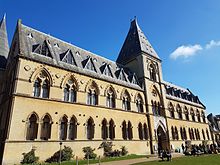Hope Entomological Collections

Front view of Oxford University Museum
|
|
| Established | 1850 |
|---|---|
| Location | Parks Road, Oxford, England |
| Coordinates | 51°45′31″N 1°15′21″W / 51.7586°N 1.2557°W |
| Type | University museum of natural history |
| Website | www.oum.ox.ac.uk |
The Oxford University Museum of Natural History, sometimes known simply as the Oxford University Museum or OUMNH, is a museum displaying many of the University of Oxford's natural history specimens, located on Parks Road in Oxford, England. It also contains a lecture theatre which is used by the University's chemistry, zoology and mathematics departments. The University Museum provides the only access into the adjoining Pitt Rivers Museum.
The University's Honour School of Natural Science started in 1850, but the facilities for teaching were scattered around the city of Oxford in the various colleges. The University's collection of anatomical and natural history specimens were similarly spread around the city.
Regius Professor of Medicine, Sir Henry Acland, initiated the construction of the museum between 1855 and 1860, to bring together all the aspects of science around a central display area. In 1858, Acland gave a lecture on the museum, setting forth the reason for the building's construction. He viewed that the University had been one-sided in the forms of study it offered—chiefly theology, philosophy, the classics and history—and that the opportunity should be offered to learn of the natural world and obtain the "knowledge of the great material design of which the Supreme Master-Worker has made us a constituent part". This idea, of Nature as the Second Book of God, was common in the 19th century.
...
Wikipedia

